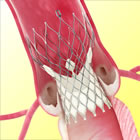Direct aortic access for delivery of a transcatheter aortic valve implant (TAVI) is necessary in patients who have severely compromised femoral arteries due to peripheral artery disease, arteries that are too narrow, or anatomy that contraindicates either the transfemoral or transapical approaches. The CoreValve ADVANCE Direct Aortic Study is an observational study, examining the results from 100 patients who received the device at nine European sites.
This morning's presentation showed that the direct aortic approach with the CoreValve is a safe and effective alternative with low rates of mortality (all-cause was 4.4%). There were no disabling strokes in the patient cohort and only a single non-disabling stroke (1%). The paravalvular leak (PVL) rates were equally low: 98.7% of patients were free from moderate or severe PVL (1.3% moderate, 0% severe). Mean gradient at discharge was 8.4 ± 3.7 mmHg.
The study also utilized a Quality of Life questionnaire which will be integrated into a future cost effectiveness analysis. At discharge the patients experienced significant improvements in quality of life, gaining 18 ± 28 points at 30 days, as well as substantial improvements in heart failure symptoms, shown by a gain of at least one New York Heart Association (NYHA) class in 73.5% of patients. Interestingly, the need for permanent pacemaker implantation in patients (14.5%) was lower than has been reported in previous CoreValve studies, although still higher than other valves in its class. Investigators estimate that the study will be completed by summer of 2015.
This morning's press release from Medtronic, Inc. follows:
Medtronic CoreValve System Shows Exceptional Outcomes and Valve Performance in TAVI Patients Treated Via Direct Aortic Access
Late-Breaking ADVANCE Direct Aortic Study Presented at EACTS Reaffirms CoreValve System's Positive Performance with Low Mortality and Stroke
October 13, 2014 -- Minneapolis and Milan -- Medtronic, Inc. (NYSE: MDT) today announced positive data from nine European centers in a study of the direct aortic approach (through the upper chest) with the CoreValve® System is a safe and effective alternative for aortic stenosis patients at increased risk for surgery who are not suitable for transcatheter aortic valve implantation (TAVI) via the standard transfemoral approach (through the upper leg). The positive outcomes in the CoreValve ADVANCE Direct Aortic (DA) Study of 100 patients demonstrated low rates of mortality, stroke and paravalvular leak (PVL) at 30 days.
Presented during a late-breaking clinical session at the 29th Annual Meeting of the European Association for Cardio-Thoracic Surgery (EACTS 2014) in Milan, the primary endpoint of all-cause mortality at 30 days was 4.4 percent with the CoreValve System. Stroke rates were among the lowest reported to date for the CoreValve System, with no occurrences of disabling stroke and one non-disabling stroke observed (1.0 percent). Overall valve hemodynamic (blood flow) performance was strong, with mean gradients (resistance) of 8.4 ± 3.7 mmHg at discharge. PVL rates were exceptionally low, with 98.7 percent of patients free from moderate or severe PVL (1.3 percent moderate, 0 percent severe), as confirmed by an independent echocardiography core lab. Additionally, the permanent pacemaker implantation rate for patients in this study was 14.5 percent.
"These data further support the strong valve performance we've come to expect from the CoreValve System," said Giuseppe Bruschi, M.D., cardiac surgeon at A De Gasperis Cardiology & Cardiac Surgery Department, Niguarda Ca' Granda Hospital, Milan, Italy, and co-primary investigator in the ADVANCE DA Study who presented the data. "It's particularly compelling to have demonstrated comparable positive outcomes with the direct aortic approach, since patients who are not candidates for TAVI via the standard transfemoral approach have typically demonstrated poorer outcomes."
The study also found that CoreValve patients experienced significant improvements in quality of life, with patients gaining 18 ± 28 points at 30 days as measured by the Kansas City Cardiomyopathy Questionnaire (KCCQ) 100-point scale, where five points is considered an improvement, and 20 points is considered a large, clinically important improvement. Additionally, a majority of patients experienced substantial improvements in heart failure symptoms following the procedure, as shown by an improvement of at least one New York Heart Association (NYHA) class in 73.5 percent of patients.
For some severe aortic stenosis patients who are at increased risk for surgical valve implantation, the standard transfemoral approach with TAVI may not be an option due to a number of anatomical limitations, such as heavy vascular calcification, peripheral artery disease and small iliofemoral vessel diameter.
The ADVANCE DA Study, a first-of-its-kind prospective, multi-center clinical study to exclusively evaluate the safety and efficacy of the direct aortic access approach to TAVI, enrolled 100 patients across nine European centers, who will be followed for one year. The study leveraged best practice implantation technique including CT-based sizing in addition to an independent core laboratory analysis of all MSCT and echocardiographic data.
The CoreValve System has a self-expanding Nitinol frame designed to minimize unwanted leakage and optimize blood flow. In addition, the CoreValve System offers the broadest range of sizes available to accommodate more patients. The device is approved by the U.S. Food and Drug Administration (FDA) for patients at extreme risk and high risk for surgery. Since receiving CE (Conformité Européenne) Mark in 2007, the CoreValve System has been implanted in more than 65,000 patients in more than 60 countries.
In collaboration with leading clinicians, researchers and scientists worldwide, Medtronic offers the broadest range of innovative medical technology for the interventional and surgical treatment of cardiovascular disease and cardiac arrhythmias. The company strives to offer products and services that deliver clinical and economic value to healthcare consumers and providers around the world.
About Medtronic
Medtronic, Inc. (www.medtronic.com), headquartered in Minneapolis, is the global leader in medical technology - alleviating pain, restoring health and extending life for millions of people around the world.
Any forward-looking statements are subject to risks and uncertainties such as those described in Medtronic's periodic reports on file with the Securities and Exchange Commission. Actual results may differ materially from anticipated results.

